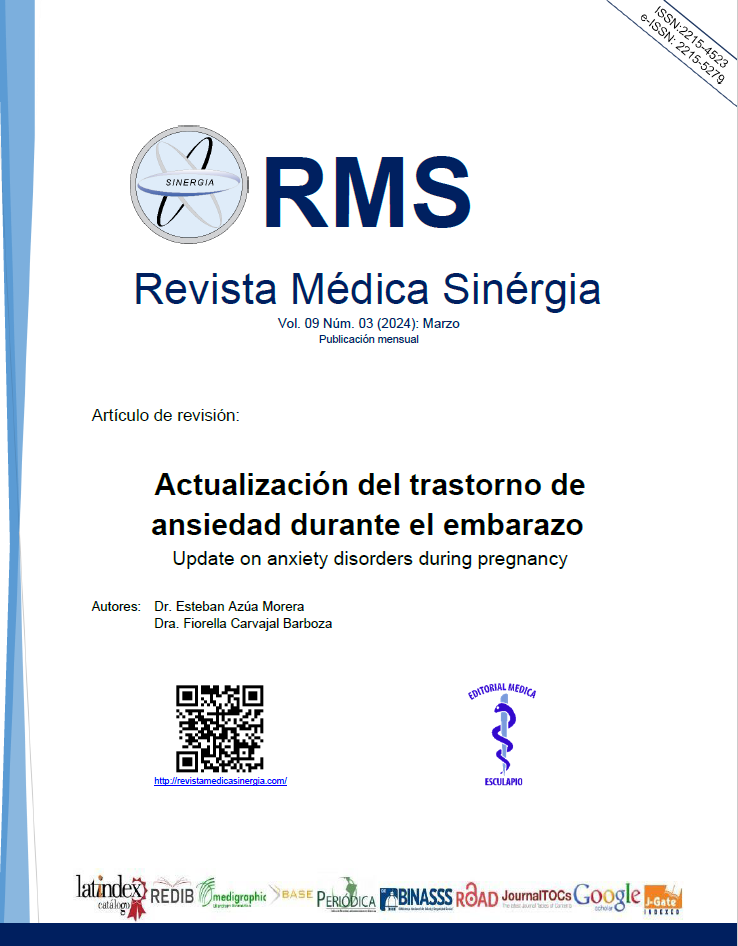Resumen
El trastorno de ansiedad durante el embarazo es el miedo relacionado con la gestación, el parto y la maternidad que pueden llegar a presentar las mujeres embarazadas. Afecta de un 15 a un 23% de las mujeres embarazadas. Se relaciona con factores de riesgo como lo son los antecedentes de depresión o ansiedad en la mujer, embarazos de alto riesgo, exposición a eventos estresantes, e incluso influyen aspectos socioeconómicos y demográficos. El diagnóstico es clínico y se basa en escalas específicas que deben aplicarse periódicamente. El tratamiento principal son las medidas no farmacológicas, como lo son la terapia cognitivo-conductual, el fortalecimiento de las redes de apoyo y estilos de vida saludables. Como segunda línea de tratamiento, se pueden utilizar fármacos como lo son los inhibidores selectivos de la recaptura de serotonina, pero siempre considerando el riesgo y el beneficio que puede tener para el feto. Es vital para los profesionales de la salud estar capacitados en el reconocimiento temprano de estos trastornos, así como en la prevención y tratamiento, para mitigar posibles complicaciones en la salud tanto de la madre como del bebé. En esta revisión bibliográfica se evalúan la epidemiología, el diagnóstico y el tratamiento del trastorno de ansiedad durante el embarazo, con especial énfasis en las herramientas diagnósticas y el tratamiento no farmacológico que se les puede brindar a las pacientes.
Citas
Gentile S. Untreated depression during pregnancy: Short- and long-term effects in offspring. A systematic review. Neuroscience. [Internet]. 2020 [citado el 23 diciembre 2023];342:154-166. DOI: 10.1016/j.neuroscience.2015.09.001
Sinesi A, Maxwell M, O'Carroll R, Cheyne H. Anxiety scales used in pregnancy: systematic review. BJPsych Open. [Internet]. 2019 [citado el 20 diciembre 2023];5(1):e5. DOI: 10.1192/bjo.2018.75
Dennis CL, Falah-Hassani K, Shiri R. Prevalence of antenatal and postnatal anxiety: systematic review and meta-analysis. The British Journal of Psychiatry. [Internet]. 2018 [citado el 23 diciembre 2023];210(5):315-323. DOI: 10.1192/bjp.bp.116.187179
Fairbrother N, Janssen P, Antony MM, Tucker E, Young AH. Perinatal anxiety disorder prevalence and incidence. Journal of Affective Disorders. [Internet]. 2019 [citado el 17 diciembre 2023];243:201-208. DOI: 10.1016/j.jad.2015.12.082
Kingston D, Janes-Kelley S, Tyrrell J, Clark L, Hamza D, Holmes P, ... McDonald S. An integrated web-based mental health intervention of assessment-referral-care to reduce stress, anxiety, and depression in hospitalized pregnant women with medically high-risk pregnancies: a feasibility study protocol of hospital-based implementation. JMIR Research Protocols. [Internet]. 2019 [citado el 20 diciembre 2023];8(1):e11439. DOI: 10.2196/resprot.4037
Biaggi A, Conroy S, Pawlby S, Pariante CM. Identifying the women at risk of antenatal anxiety and depression: A systematic review. Journal of Affective Disorders. [Internet]. 2018 [citado el 18 diciembre 2023];191:62-77. DOI: 10.1016/j.jad.2015.11.014
Navarrete LE, Lara-Cantu MA, Navarro C, Gomez ME, Morales F. Risk of antenatal anxiety and depressive symptoms: A meta-analysis. [Internet]. 2018 [citado el 23 diciembre 2023].
Woody CA, Ferrari AJ, Siskind DJ, Whiteford HA, Harris MG. A systematic review and meta-regression of the prevalence and incidence of perinatal depression. Journal of Affective Disorders. [Internet]. 2018 [citado el 20 diciembre 2023];219:86-92. DOI: 10.1016/j.jad.2017.05.003
Durankuş F, Aksu E. Effects of the COVID-19 pandemic on anxiety and depressive symptoms in pregnant women: a preliminary study. The Journal of Maternal-Fetal & Neonatal Medicine. [Internet]. 2020 [citado el 23 diciembre 2023];1-6. DOI: 10.1080/14767058.2020.1763946
Marín-Morales D, Toro-Molina S, Peñacoba-Puente C. Anxiety in pregnancy: prevalence, associated factors and its impact on mother and child. Journal of Reproductive and Infant Psychology. [Internet]. 2020 [citado el 19 diciembre 2023];38(4):354-366.
Ravaldi C, Ricca V, Wilson A, Homer C, Vannacci A. Pregnant women voice their concerns and birth expectations during the COVID-19 pandemic in Italy. [Internet]. 2018 [citado el 20 diciembre 2023];36(4):370-382. DOI: 10.1016/j.wombi.2020.07.002
Saccone G, Ciardulli A, Xodo S, Dugoff L, Berghella V. Psychological impact of first-trimester screening for chromosomal abnormalities: A systematic review. The Journal of Maternal-Fetal & Neonatal Medicine. [Internet]. 2018 [citado el 23 diciembre 2023];31(24):3248-3254. Available from: [URL del artículo].
Feldman R, Granat A. Maternal anxiety and depression and the development of the parent-infant relationship: A longitudinal study from pregnancy to 24 months postpartum. Development and Psychopathology. [Internet]. 2019 [citado el 18 diciembre 2023];31(1):13-26. DOI: 10.1097/CHI.0b013e3181b21651
Tuovinen S, Lahti-Pulkkinen M, Girchenko P, Lipsanen J, Lahti J, Heinonen K. Maternal depressive symptoms during and after pregnancy and child developmental milestones. Depression and Anxiety. [Internet]. 2018 [citado el 15 diciembre 2023];35(8):732-741. DOI: 10.1002/da.22756
Horsch A, Lalor J, Downe S. Moral and ethical dilemmas in the special care nursery: The relationship between anxiety during pregnancy and moral and ethical decision making. BMC Pregnancy and Childbirth. [Internet]. 2018 [citado el 15 diciembre 2023];18(1):320. DOI: 10.1037/tra0000629
Fawcett EJ, Fairbrother N, Cox ML, White IR, Fawcett JM. The prevalence of anxiety disorders during pregnancy and the postpartum period: A multivariate Bayesian meta-analysis. Journal of Clinical Psychiatry. [Internet]. 2019 [citado el 17 diciembre 2023];80(4):18r12527. DOI: 10.1016/j.wombi.2014.08.002
Rallis S, Skouteris H, McCabe M, Milgrom J. A prospective examination of depression, anxiety and stress throughout pregnancy. Women and Birth. [Internet]. 2018 [citado el 17 diciembre 2023];31(6):e342-e352. DOI: 10.1016/j.wombi.2014.08.002
Huizink AC, Menting B, Oosterman M, Verhage ML, Kunseler FC, Schuengel C. The interrelationship between pregnancy-specific anxiety and general anxiety across pregnancy: A longitudinal study. Journal of Psychosomatic Obstetrics & Gynecology. [Internet]. 2019 [citado el 18 diciembre 2023];40(3):217-226. DOI: 10.1007/s00737-017-0746-5

Esta obra está bajo una licencia internacional Creative Commons Atribución-NoComercial 4.0.
Derechos de autor 2024 Array


